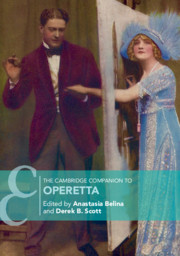Book contents
- The Cambridge Companion to Operetta
- Cambridge Companions to Music
- The Cambridge Companion to Operetta
- Copyright page
- Contents
- Illustrations
- Tables
- Music Examples
- Notes on Contributors
- Chronology, 1855–1950
- Introduction
- Part I Early Centres of Operetta
- Part II The Global Expansion of Operetta
- Part III Operetta since 1900
- 12 The Operetta Factory: Production Systems of Silver-Age Vienna
- 13 Berlin Operetta
- 14 Operetta in Italy
- 15 Operetta in Warsaw
- 16 British Operetta after Gilbert and Sullivan
- 17 Operetta During the Nazi Regime
- 18 Operetta Films
- 19 Australian Director Barrie Kosky on the Subversiveness of a Predominantly Jewish Genre: An Interview by Ulrich Lenz
- Select Bibliography
- Index
- References
16 - British Operetta after Gilbert and Sullivan
from Part III - Operetta since 1900
Published online by Cambridge University Press: 14 November 2019
- The Cambridge Companion to Operetta
- Cambridge Companions to Music
- The Cambridge Companion to Operetta
- Copyright page
- Contents
- Illustrations
- Tables
- Music Examples
- Notes on Contributors
- Chronology, 1855–1950
- Introduction
- Part I Early Centres of Operetta
- Part II The Global Expansion of Operetta
- Part III Operetta since 1900
- 12 The Operetta Factory: Production Systems of Silver-Age Vienna
- 13 Berlin Operetta
- 14 Operetta in Italy
- 15 Operetta in Warsaw
- 16 British Operetta after Gilbert and Sullivan
- 17 Operetta During the Nazi Regime
- 18 Operetta Films
- 19 Australian Director Barrie Kosky on the Subversiveness of a Predominantly Jewish Genre: An Interview by Ulrich Lenz
- Select Bibliography
- Index
- References
Summary
The chapter begins with a survey of musical comedy of the 1890s and early twentieth century. A brief account of Edward German and his operettas follows. Noël Coward established himself as a British operetta composer with Bitter Sweet in 1929. However, the person who did most to keep English operetta alive in the 1930s was the Welsh composer Ivor Novello (1893–1951). He gained a considerable amount of experience both as a composer for the stage and as an actor before completing his first operetta, Glamorous Night, in 1935. This chapter assesses Novello’s achievements, musical and dramatic, and investigates the critical reception of his operettas. It places him in the context of what came before (Fraser-Simson, Montague Phillips, Noël Coward) and what came after (Vivian Ellis, Julian Slade, Sandy Wilson).
Keywords
- Type
- Chapter
- Information
- The Cambridge Companion to Operetta , pp. 246 - 260Publisher: Cambridge University PressPrint publication year: 2019

